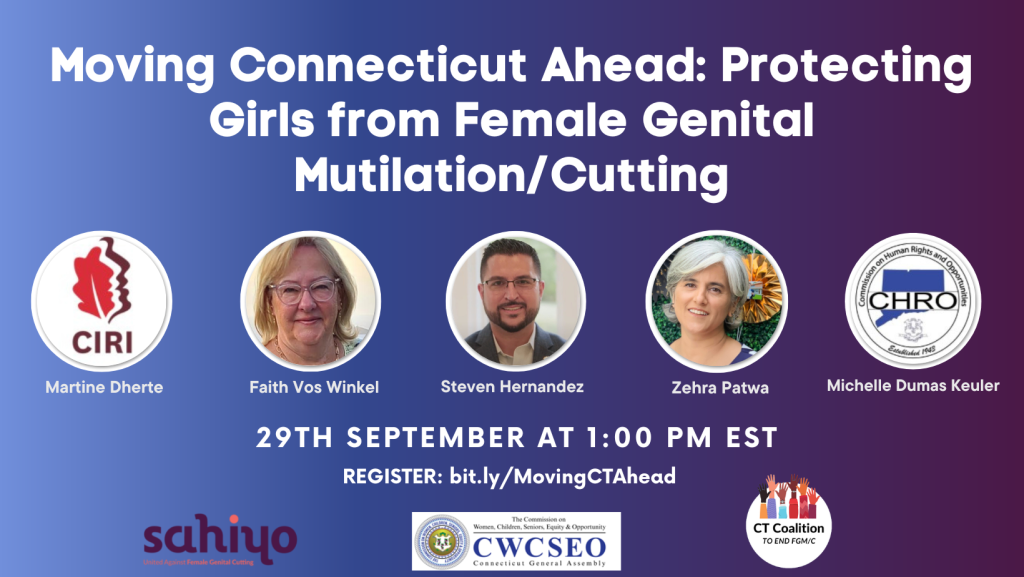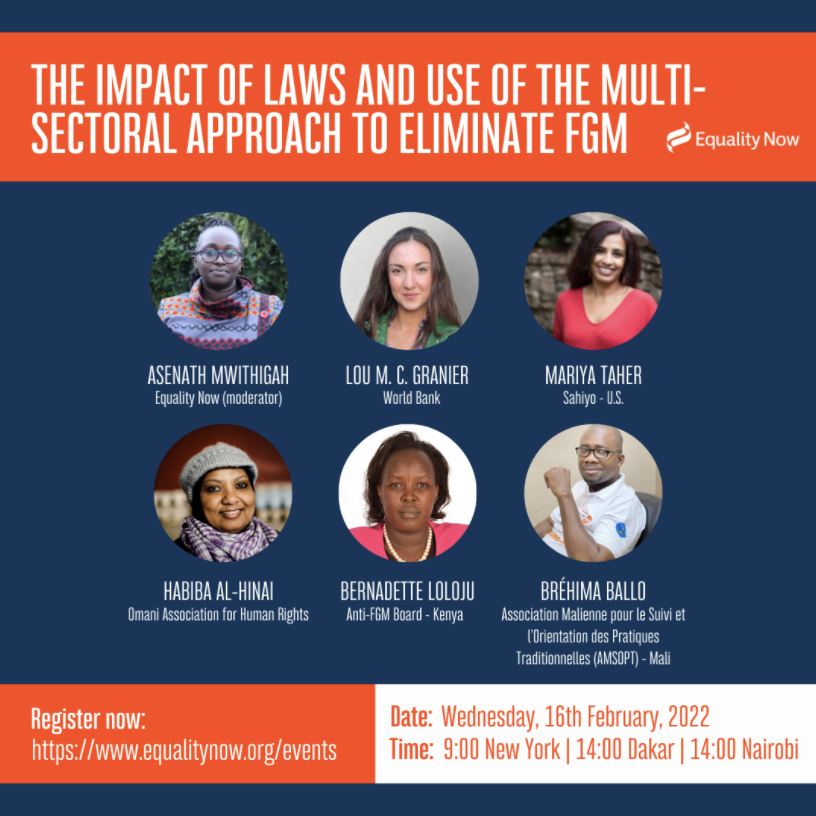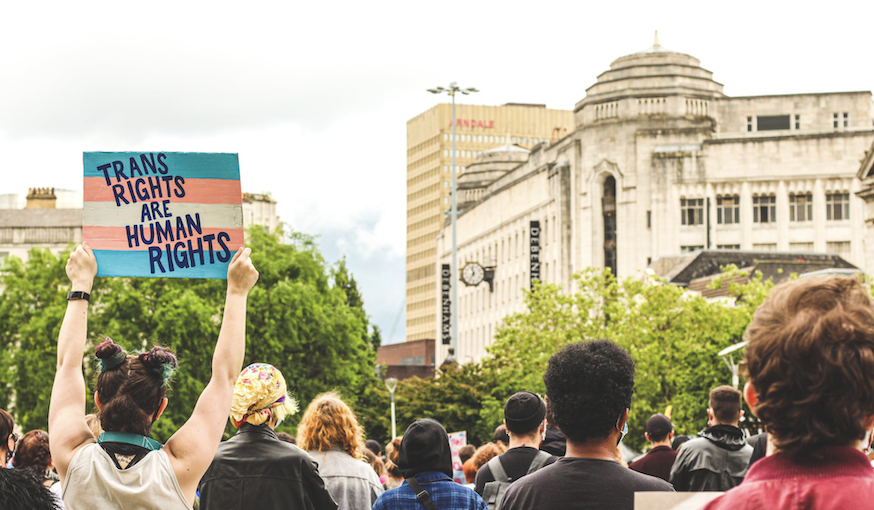Reflecting on ‘Moving Connecticut Ahead: Protecting Girls from FGM/C’, a webinar

By Meg Sinnott On September 29th, Sahiyo partnered with The CT Coalition to End FGM/C and The Commission on Women, Children, Seniors, and Equitable Access for All to host Moving Connecticut Ahead: Protecting Girls from FGM/C. This webinar was held to inform legislators, community members, and other stakeholders on the issue of female genital cutting (FGC) and how it impacts girls in the state. Connecticut (CT) remains one of the ten states in the U.S. with no legal protections against FGC. The webinar brought together key individuals living in the state of CT to discuss their reasons for supporting the passage of a law to end the social norm of FGC. Panelists included: Steven Hernandez – The Commission on Women, Children, Seniors, Equity & Opportunity Zehra Patwa – WeSpeakOut Michelle Dumas Keuler – Connecticut Commission on Human Rights and Opportunity Faith Vos Winkel – Connecticut Office of the Child Advocate Martine Dherte – Connecticut Institute for Refugees and Immigrants As a participant of the webinar, I thought that the panelists conveyed their message very effectively and eloquently: CT needs to adopt anti-FGC legislation now. As a former CT resident myself, I was shocked when I first found out that CT does not have a law already. A 2013 Population Reference Bureau study found that 2,658 women and girls in CT are at risk of undergoing or have already undergone FGC. For me, earlier feelings of shock have concretized into a need to take action, which includes helping to facilitate this webinar. I am very proud of the work that is being done by CT advocates, allies, and survivors to amplify awareness of FGC and its impacts, so that lasting change can be made. From conversations I have had with friends and family who live in CT, I’ve observed an assumption that somewhere like CT would not need legislation against FGC; this is due to the misconception that FGC only happens overseas, such as in countries within Africa and Asia. It was also surprising to hear that CT is so far behind other states in terms of protecting the rights of girls and other people using legislation since gender equity is a key priority for the state. In fact, US News & World Report recently lauded CT for its achievements on this issue, especially when it comes to equal access to economic opportunities. But even economic equity is limited when we don’t have the full participation of all of our women and girls. FGC reflects and perpetuates a broader trend of gender inequality. Zehra Patwa, a survivor of FGC and member of the Dawoodi Bohra community, spoke to the social norm piece of FGC through her discussion of how legislation could impact the prevalence of FGC in the Bohra community, which is one that abides by the law of the land and prioritizes the law before traditional practices. She demonstrated the universal truth that every society is influenced by norms that guide behavior and can help to solidify what conduct is acceptable or unacceptable within the group. Individuals may be socially sanctioned for not following social norms, which has been seen in instances of survivors and activists of FGC speaking out against the practice. Michelle Dumas Keuler explained how laws and policies that are shaped by our culture protect human rights, clarifying that CT needs anti-FGC laws (despite the existing federal law) to make prosecution more accessible, as well as to communicate to the wider community that CT is a state that values its girls and protects its citizens from harm. Faith Vos Winkel helped shed light on the impact that laws can have on a community. She expressed that every society has harmful social norms: not too long ago in the U.S. hitting children was considered acceptable. Domestic violence between a husband and a wife was legally permissible up until the 1970s, and it was considered a private matter. One takeaway I had from the webinar was that our knowledge of harmful norms has evolved, and so too has legislation in CT evolved in order to support ending these other harmful practices. The panel discussion made clear to me that in order to truly make an impact, we must support a holistic or multifaceted approach to address FGC, as we have for other harmful social norms like domestic violence, by writing advocacy and educational opportunities into the law. Watch the recording of this webinar here.
Moving Connecticut ahead: Protecting girls from Female Genital Mutilation/Cutting

Date: Sep 29, 2022 Time: 1 PM to 2:30 PM EST (90 mins) Registration Link: bit.ly/MovingCTAhead In partnership with the Connecticut Commission on Women, Children, Seniors, Equity and Opportunity and The Connecticut Coalition to End Female Genital Mutilation/Cutting (FGM/C), Sahiyo will be hosting “Moving Connecticut Ahead: Protecting Girls FGM/C. In 2013, the Population Reference Bureau estimated that 2,658 women and girls in Connecticut (CT) were at risk of undergoing – or having already undergone – female genital mutilation/cutting (FGM/C). FGM/C is a harmful social norm practiced worldwide and the United Nations has declared it a human rights violation. In Connecticut, many other human rights violations stemming from social norms have been addressed through legislation such as human trafficking, child marriage, and conversion therapy. However, Connecticut has yet to address the issue of FGM/C and remains one of 10 U.S. states without any state-level law protecting future generations from this harm. This webinar will explore how Connecticut can move forward to address this issue through legislation to better protect its women and girls from FGM/C. Get to know the panel! Moderator: Steven Hernández Steven Hernández, Esq Executive Director CT Commission on Women, Children, Seniors, Equity and Opportunity CT General Assembly Steven Hernández, Esq. is the Executive Director of the CT Commission on Women, Children, Seniors, Equity and Opportunity, a non-partisan agency of the Connecticut General Assembly. At the Commission, Mr. Hernández serves as the legislative lead for the State’s 2GEN initiative, an approach that puts family at the center of improved community outcomes, and as drivers of long-term economic success. Mr. Hernández proudly serves on several volunteer boards and commissions rooted in public service. He previously served the CT state legislature as Director of Public Policy and Research for the Connecticut Commission on Children. Prior to joining the Commission, Mr. Hernández served seven years as legislative and budget director in the office of Washington, D.C., Council member Jim Graham. Mr. Hernández served as a clerk to two judges in the District’s Court of Appeals and as a consultant to the Washington law firm Baker & Miller, PLLC. He received a Bachelor of Arts Degree from Bennington College in Vermont in 1995 and a Juris Doctor Degree from the Washington College of Law at American University. Speakers: Zehra Patwa Zehra Patwa is the Co-Founder and US Lead of WeSpeakOut, an organization that strives to work for equal rights for Bohra women in all spheres of life, specifically, on Female Genital Mutilation/Cutting (FGM/C) or khafz. She grew up in London and was educated at the University of Bradford Management Centre in the UK and the Université de Montpellier in France. Zehra serves on several Boards, including Integrated Refugee and Immigrant Services (IRIS), and currently serves as Vice-Chair of the Sahiyo US Advisory Board. After discovering well into adulthood, that khatna or khafz (type 1 FGM/C) was practiced in her community and that she, too, had been subjected to it, she decided she could no longer keep silent. Although she has no recollection of the practice being done to her, she is vehemently opposed to it and has been working with WeSpeakOut to expose the practice within, and outside, the community. She currently works in Digital Customer Delivery for the Knights of Columbus in New Haven, Connecticut. Faith Vos Winkel Before Faith’s recent retirement from Government, Faith Vos Winkel began her work with the Office of the Child Advocate in July 2001 and assists the Child Advocate to fulfill her statutory mandates including overseeing the systems of care and protection for children in Connecticut and advocating for their well-being. Faith’s primary responsibilities focus on the review of all unexpected and unexplained child deaths in Connecticut. She is responsible for preparing child fatality cases and conducting comprehensive investigations. Faith represents the Child Advocate on a variety of statewide policy committees including the Suicide Advisory Board, CT Coalition Against Domestic Violence Fatality Review Committee, and the Governor’s Task Force on Justice for Abused Children. Ms. Vos Winkel has an undergraduate degree from the University of Connecticut and a Masters of Social Work from the University Of Connecticut. Martine Dherte Martine Dherteis the Program Manager for refugee services at the Connecticut Institute for Refugees and Immigrants. She uses her platform to educate newly arrived refugees resettled by her organization in Bridgeport. She would like her programs, which currently includes GBV services to address FGM and become a stronger advocate in the field. She is passionate about protecting women and girls from all forms of abuse. Michelle Dumas Keuler Michelle Dumas Keuler is the Managing Director of the Housing, Training and Appeals divisions of the Legal Division and Commission Counsel with the State of Connecticut Commission on Human Rights and Opportunities (“CHRO”). Founded in 1943, the CHRO is the nation’s oldest state based civil rights organization. The Commission is charged with investigating and prosecuting cases of employment, housing, public accommodation and credit discrimination. As a Managing Director, Ms. Dumas Keuler represents the agency in its prosecution of employment, housing and public accommodation discrimination cases before agency Human Rights Referees, in state court, and federal court. Ms. Dumas Keuler has extensive experience training in the areas of housing, employment and public accommodation discrimination, employer best practices and sexual harassment discrimination. She has trained countless landlords, tenants, housing authorities, state and municipal employees and employers regarding discrimination statutes and their enforcement by the CHRO. Ms. Dumas Keuler also works on policy for the Commission and is active in promoting the legislative initiatives of the agency.
The Connecticut Coalition to End FGM/C speaks with the Hartford Times

Within the U.S., there are currently 10 states without any laws in place to protect girls from Female Genital Mutilation/Cutting (FGM/C); Connecticut is one of those states. Since 2021, the Connecticut Coalition to End FGM/C has been working to build holistic solutions for supporting survivors and preventing future generations of girls from experiencing FGM/C in the State of Connecticut. The Coalition is made up of a diverse range of stakeholders, who advocate for comprehensive legislation to protect girls from FGM/C, provide survivors with support services, raise awareness of the harm FGM/C causes, and educate frontline professionals on how to provide culturally specific and sensitive care. In June 2022, CT Coalition members Mariya Taher of Sahiyo and Steven Hernandez of theCT Commission on Women, Children, Seniors, Equity & Opportunity hosted a conversation to discuss women’s bodily autonomy and FGM/C, to further raise awarenss of this issue within the state. Listen to their conversation here.
Sahiyo speaks at the ABA International Law Section Annual Conference

On April 28th, Sahiyo was invited to take part in a panel discussion at the 2022 ABA International Law Section’s Annual Conference being held in Washington D.C. The panel brought together a legal practitioner, journalist, and activist working towards gender equality and the elimination of FGC to discuss legal tools and other measures that have been adopted to end this practice worldwide. Program Chair: Sandrine Siewe, Georgetown Law, Washington, DC Moderator: Bayor Chantal Ngoltoingar, Anti FGM Advocate Speakers: Isabella Micali Drossos, Senior Counsel, World Bank Shelby Quast, Robertson, Quast & Associates, US End FGM/C Network Giselle Portenier, Journalist, End FGM Canada Network Mariya Taher, Cofounder, Sahiyo, US End FGM/C Network During the event, speakers introduced the World Bank’s Fifth edition of the Compendium of International and National Legal Frameworks. The speakers also highlighted Federal- and state-level policy and law around FGC in the United States, and spoke to measures and programs that can help those impacted by FGC recover from the harms caused by this practice. Moreover, the panelists discussed the role of a bottom-up-oriented strategy, such as active and intergenerational dialogues within communities, for finding solutions to end FGC.
A reflection on Equality Now’s webinar: The impact of laws and use of Multi-Sectoral Approach (MSA) to eliminate FGM/C

By Ellen Ince I joined Equality Now and women’s rights activists, survivors, and human rights practitioners for a discussion on the importance and roles of both law and multi-sectoral approach (MSA) in the elimination of Female Genital Mutiliation/Cutting (FGM/C). This event took place on February 16th, 2022 and was moderated by Asenath Mwithigah. Interpretation was provided in English, French and Arabic. How can not only protect, but advance the rights of women around the world? FGM/C is a form of discrimination that has life long affects. It directly impacts a woman’s right to dignity, right to life, freedom from torture and inhuman treatment, freedom from discrimination based on gender, and right to the highest attainable health among other rights. Ending FGM/C can be done through advocacy and law, with the two going hand in hand. While many think that FGM/C is only practiced in Africa, a recent study by Equality Now (in collaboration with the US End FGM/C Network and The European FGM Network) found that FGM/C is carried out in 92 countries. This makes it a global issue that requires a co-ordinated multi-sectoral approach. Of these 92 coutnries where it is practised, only 51 have specifically addressed issues of FGM/C in law. Are laws alone enough? Worldwide 68 million women and girls will be at risk of FGM/C by the year 2030 if the current levels of intervention as they are remain in place. As trends are globally changing, so too is the issue itself. As a social norm that does not respect geographic boundaries, FGM/C has filtered into Europe and spread to non-practising countries through migration. This has resulted in FGM affecting every continent. Speakers underlined that interventions need to be holistic and integrate a multi-sectoral approach to be able to address these emerging issues. Law sets the standard of what is morally acceptable behaviour. The absence of anti-FGM/C law therefore poses a threat to our efforts to combat the issue. FGM/C challenges the core foundations of human rights and breaches the universal standard of what is morally correct. Laws prohibiting FGM/C have a powerful impact in eliminating the practise. Time to change challenges into opportunities. Caroline Lagat stated that although FGM/C is a national priority in many countries, only a handful allocate a budget towards the realisation of their anti-FGM/C strategies or in fact the implementation of programmes targeting to end FGM/C. This point made me realise that the presence of law alone is not enough. Financial resources are essential in the proper implementation of these laws. Caroline stressed that the commitment to end FGM/C also needs to come in the form of financial investment. The event featured panellist Mariya Taher, who since 2015 has collaborated with the Women’s Bar Association of Massachusetts to pass legislation to protect girls from FGC. Mariya has been an instrumental advocate and expert in ending FGC. She spoke about the need to cover vacation cutting under state law and gave a brief history of FGM/C federal law. In 1996 the US passed a federal law making FGM/C illegal. This law was amended in 2013 to include a travel provision. Mariya explained the success of this law as it closes the loophole that previously existed that allowed for girls to be taken out of the country to have FGM/C performed on them. Mariya agreed that law can be used as a tool to discourage the practice and that this justifies the need for funding. FGM/C is a crime. It is important how we frame it. Lou Granier, a French international consultant in development specialising in gender, has specifically dedicated to work towards the eradication of FGM/C and has been working with the world bank and numerous NGO’S. Lou made it clear that every country in the world has a law on FGM/C. The law may not specifically target FGM/C but every jurisdiction provides protection against harm and torture. She explains that France for example does not have a specific FGM/C law. FGM/C, however remains illegal in France. Lou pointed out that using general laws to protect women from FGM is good strategy to consider. She did state that specific FGM/C laws are important because they specifically define and criminalises it, leaving no room for vagueness and further protecting women from legal discrimination. The work against FGM goes further than borders. Madame Bernadette Loloju, a passionate girls rights crusader committed to ending the practice of FGM/C in Kenya also spoke about cross border FGM/C as a challenge. She accurately framed this challenge as ‘people running away from the law’. This demonstrates that law can only stretch so far and that people are going behind the law. Even with law in place we need other strategies in place to end FGM/C. A multi sectoral approach may provide the answer whilst saving on resources such as time. This approach also allows for more collaboration and teamwork. FGM – a tradition wrapped in extreme secrecy. Human rights defender, Habiba Al-Hinai, discussed the power of individuals and activists. This is especially prevalent in citations where the government is silent or inactive. The government can provide a law but law has a limited impact. It is the people that can create change by acting as advocates and adding pressure. Ballo Bréhima, a program manager of an NGO in Mali states that law teaches communities that FGM/C is harmful and not good for the health of young girls and women. Education surrounding FGM/C is crucial as someone who is aware of the inequalities of this practice will not cut their daughters. It is also important to change the minds of those who underwent FGM/C themselves. Mariya highlighted that survivors can also be the voices for their own daughters. An important point I took away from this webinar is that with FGM/C, the problem is not that the law does not condone it, but that the culture in which it occurs reinforces it. The panel discussion followed by a question and answer session led by Paleki Ayang. I particularly
Gender-Affirming Treatments are not Female Genital Cutting

By Hunter Kessous Female genital cutting (FGC), which is the practice of removing or harming the female genitalia for non-medical reasons, is a human rights violation recognized by the UN. Right now, legislators in Texas and Idaho are looking to use pre-existing bans on FGC to block transgender youth from receiving life-saving, medically necessary gender-affirming treatments. This is a discriminatory action that has no basis in the crucial work to end FGC. Gender-affirming care can include social interventions, pubertal suppression, hormone therapy, and gender-affirming surgeries. Social interventions are typically the first step; use of a new name and pronouns, wearing different clothing, and engaging in new activities are often a part of this process. Pubertal suppression is a method of delaying puberty, and hormonal therapy causes secondary sex characteristic development that aligns with one’s gender. Both are reversible and associated with better mental health outcomes for transgender youth. Gender-affirming surgeries, such as mastectomies and vaginoplasty, are irreversible treatments performed on older adolescents who have shown a consistent gender identity and have stable mental health and parental support. Research has shown that these treatments lead to decreased rates of depression, improvement in psychosocial functioning, and minimal long-term side effects. Transgender and nonbinary adolescents experience anxiety, depression, and suicidal ideation at higher rates than cisgender people. According to a report from The National Center for Transgender Equality, 40% of transgender people in the U.S. had attempted suicide at some point in their lives, which is nearly nine times the nationwide suicide rate. Gender-affirming care can significantly improve this mental health crisis. Governor Greg Abbott of Texas was most definitely mistaken when he said “any type of genital mutilation is child abuse” regarding gender-affirming surgery; it is not mutilation, and denial of this care could be more accurately called a form of child abuse by failing to treat serious mental health needs. Texas has attempted to pass several laws that ban transgender youth from access to puberty blockers, hormone therapy, and surgery. Just last year, two of these bills died in session. These failed attempts have led legislatures to turn to FGC laws as a way of making gender-affirming surgery illegal for transgender kids. Idaho is taking discriminatory actions similar to Texas. Earlier this month, a bill that would amend the state’s existing law on FGC to ban hormone therapy, puberty blockers, and sex reassignment surgeries cleared a House committee. The amendment would also make it a felony for doctors to provide these services, placing physicians in the tragic position of needing to risk their medical license if they want to provide life-saving care to transgender adolescents. The senate opposes this bill, so, fortunately, it is unlikely to pass. Disappointingly, their reasons for opposing the bill are neither because they see the necessity of gender-affirming care nor because they disagree with conflating this care with FGC. Rather, they do not see the bill as necessary, as many Idaho physicians are unwilling to provide gender-affirming care anyway, and fear the bill undermines the parents’ authority to make decisions for their children. Texas’s and Idaho’s legislators justify their actions with claims that these medical interventions are similar to FGC in that they are both unnecessary. Yet, gender-affirming care has medical benefits (e.g. improving mental health), while FGC does not. In fact, FGC often leads to harmful psychological outcomes, including PTSD, anxiety, and depression. Another faulty comparison drawn between FGC and gender-affirming care is that they are both irreversible. It is true that FGC has irreversible physical and psychological harms, but this is not the case for all treatments for transgender youth. Again, health professionals consider pubertal suppression and hormone therapy to be reversible. Gender surgery is permanent, but research has shown that regrets about having this procedure are very rare. The benefits of gender-affirming care (improved psychosocial functioning and autonomy over one’s gender identity) paired with the high risk of withholding treatment (worsened mental health outcomes, suicidal ideation and use of non-prescription hormones) support the importance of providing this care. Lastly, medical care for transgender people is their choice as part of their right to bodily autonomy, whereas FGC violates a girl’s right to bodily autonomy. Minors are often forced to undergo FGC and are too young to fully understand what is occurring and give their consent. Furthermore, consent cannot be given when there is coercion. FGC often exists as a result of societal pressure placed on girls who are told FGC is necessary for them to be a woman, to be a member of their own culture and society, and to be married. Consent can not be freely given to undergo FGC, because coercion will always be a dangerous factor. It is harmful and incorrect to conflate FGC with gender-affirming care. I want to make clear that FGC survivors and transgender and non-binary people are not mutually exclusive communities. People who have undergone FGC and do not identify as a cisgender woman in particular would be harmed by legislation that defines gender-affirming treatments as FGC. To learn more about the nuanced experiences of non-cisgender survivors of FGC, I recommend Dena Igusti’s article on being a non-binary survivor and Dear Massi’s advice column for a transgender man who underwent FGC as a child.
Sahiyo’s statement on the Michigan case dismissal on Sep 28, 2021

It is with great sadness and disappointment that Sahiyo responds to the recent judgement in the Michigan case. Female genital cutting (FGC) is recognized internationally, and specifically by the U.S. Government as a violation of human rights. Judge Friedman’s decision to throw out this case, which is the nation’s first FGC case, highlights a failure to protect girls in the United States from this harmful practice, and a failure to truly understand the extent and pervasiveness of FGC within this country. (See the Amicus Brief, which is informed by survivors of the same community as the girls in this case, and provides details on these aspects of FGC for the judge). This judgment has been met by much criticism already, with a call from The US End FGM/C Network for more training across all branches of government, including judicial training that includes: what FGM/C is, how it is carried out, and its life-long impact on women and girls. Sahiyo believes we cannot allow harmful practices such as FGC to continue. Girls’ rights cannot go unprotected due to legal technicalities and decisions made by those who do not, or refuse to, understand the realities of gender-based violence. We must all work together to protect ALL girls from this harm and we call on the Department of Justice to appeal this decision. Background on the case On April 13, 2017, Detroit emergency room doctor Jumana Nargarwala was arrested and charged with performing FGC on minor girls in the United States. This was the first time someone was brought up on charges under 18 U.S.C. 116, which criminalizes FGC. According to the U.S. Federal complaint, Dr. Nagarwala performed FGC on 6 to 8 year old girls out of a medical office in Livonia, Michigan. Some of these girls’ families reportedly traveled inter-state to have the doctor perform FGC. On November 20, 2018, Judge Bernard Friedman ruled that the US Federal Law banning Female Genital Cutting was unconstitutional based on a technicality. With this ruling, the judge dismissed key charges of FGC against two Michigan doctors and six other people accused of practicing genital cutting on several minor girls. The ruling was determined by Judge Friedman’s stance that the crime of FGC should be regulated by individual states. However, the US does not actually have laws against FGC in every single state. At the time, only 27 out of 50 states had a state law banning FGC. As of October 2021, there are now 40 states with a state law. There is a state law in Michigan banning FGC, but the law only came into effect in 2017 after the federal case involving Dr. Nagarwala and Dr. Attar came to light. The doctors cannot be prosecuted retrospectively under this Michigan state law. After Judge Friedman’s verdict in 2018, the Department of Justice failed to appeal Judge Friedman’s decisions in 2019. As a result, Congress filed a motion to appeal the decision, but the motion was denied. In 2020, these events led Congress to unanimously amend and strengthen the Federal FGC law, in order to withstand future challenges, while firmly stating its disagreement with Judge Freidman’s interpretation of the law. In January of 2021, Congress passed the H.R. 6100-STOP FGM Act. (((To learn more about the history of this court case and legislation in the U.S., read CoP Law & FGM – Legislation in North America.) However, the combination of Judge Friedman’s recent decision in September 2021 dismissing the remaining charges against Doctor Nargarwala (and calling the prosecution ‘vindictive’ for seeking new charges), with the Department of Justice’s original decision in 2019 to not appeal his decision, underscores how protecting girls from violence was not central to the case.
The United States has a law banning female genital cutting. What now?

By Hunter Kessous On January 5th, the H.R. 6100-STOP FGM Act was signed into law, upon being passed through the House of Representatives and the Senate unanimously. The federal law criminalizes female genital cutting (FGC), a form of gender-based violence against young girls, which involves medically unnecessary partial or total removal of the external genitalia. According to the Centers for Disease Control, over 500,000 girls and women have undergone or are at risk of undergoing FGC in the United States alone. Globally, that number rises up to 3 million girls at risk per year, with a total of over 200 million girls and women having been cut. The STOP FGM Act strengthens the opposition to FGC by stating that religious or cultural beliefs may not be used in defense of the practice. Additionally, government agencies, such as the Departments of Education and Justice, will be required to report to Congress on the estimated number of women and girls who have undergone or are at risk of FGC in the U.S., and on efforts to prevent the practice. They will also give a report on the actions they take toward educating the community and preventing FGC from continuing. Advocates and policymakers have been working toward this goal for so long that it was concerning when the new law didn’t garner a lot of media attention. This could be because the U.S. has technically had a law against FGC since 1996—emphasis on technically, because for the past two years, the Department of Justice has refused to enforce the law. The only intact portion of the law has been a ban on taking a minor out of the U.S. to be cut, a practice known as vacation cutting. In 2018, a Michigan doctor was taken to court for the mutilation of over 100 girls. The judge dismissed the charges and ruled that Congress did not have the authority to pass the FGC law by associating it with the Commerce Clause, claiming that there is nothing “commercial or economic” about FGC. The STOP FGM law clarifies that FGC is, in fact, linked to inter-state or foreign commerce, thereby confirming Congress’ power to make FGC illegal. Since that pivotal case over two years ago, young girls are now protected against FGC under federal law. Although there is reason to celebrate, activists aren’t putting their feet up anytime soon. As far as policy goes, there is still more work to do. Despite the federal law, state laws against FGC are a necessary tool. Federal and state laws each protect girls in different ways. The federal law against FGC will be put to use if the crime involves interstate activity, such as transporting a girl to another state to be cut. We need state laws against FGC to protect girls in cases of local criminal activity, as was recommended by the judge in the aforementioned Michigan court case. To date, there are still 11 states which do not have any laws against FGC. In the states that do have anti-FGC policies, action must be taken to make these laws more comprehensive. Several states do not clarify that cultural/ritual reasons and alleged consent may not be used as a defense for performing FGC on a minor. Few states have legislation which includes a provision for community education and outreach, which is a key component of prevention. In addition to improving state laws, even more can be done at the federal level. Policy from the Department of Education and Health and Human Services requiring FGC education in schools can go a long way toward prevention. “While we celebrate the signing of H.R. 6100 and the recent Massachusetts law, we must continue to advocate for not only the criminalization of FGM/C, but a Federal Education Law,” said Angela Peabody, founder of the Global Woman P.E.A.C.E Foundation and political lobbyist. “It is imperative for every child in the United States to be knowledgeable about the practice of FGM/C. Even though several states have included an education clause in their laws, a federal law would cover all states. The schools already teach Family Life Education; therefore including the study of FGM/C in the FLE curriculum is not a difficult task. Virginia is already in the process of doing that.” Virginia has incorporated education about FGC into their school curriculum for middle and high schoolers in which they learn “the dangers of FGC, the criminal penalties, and the rights of the victim.” Education such as this serves to increase awareness, put an end to the thinking that FGC is not an American issue, and give a voice to the next generation of activists. The current law criminalizes FGC, and calls on several government agencies to enact programs that will protect girls and create public awareness. The law left the guidelines for these agencies vague, which leaves room for experts and advocates to guide these departments. There are many ways, for example, that policy can support girls and women living in the U.S. who have already undergone FGC, or those who will be cut in spite of the new law. Survivors face a range of physical and psychological complications. These include, but are not limited to, infection, fistulas, birth complication, sexual dysfunction, and post-traumatic stress disorder. Policy could go a long way to alleviate these burdens. For example, survivors of domestic violence are permitted to enroll in an ACA healthcare plan at any point during the year, rather than just during the open enrollment window. A policy such as this being applied to FGC survivors and their dependents would be a great step toward increasing access to healthcare. Yet, many of the less expensive healthcare plans do not provide counseling services, and this may not be apparent until after the plan has been purchased. Therefore, another area where legislation could protect FGC survivors is by creating federally funded programs to provide needed health care services, which may be lacking from their current healthcare plan, at subsidized rates or at no cost. There was
Texas woman charged for Female Genital Cutting: Sahiyo press statement

A woman from Houston, Texas (USA) has been charged under federal United States’ law for transporting a minor out of the country for the purpose of Female Genital Mutilation/Cutting (FGM/C). According to the Federal Bureau of Investigation (FBI) which is investigating this case, the 39-year-old woman allegedly transported the child sometime between July 10 to October 14, 2016. This is the first time that the US Department of Justice has indicted anyone under this specific clause of the US anti-FGM/C law, i.e, transporting a minor girl outside of US borders to facilitate the practice of genital cutting. While FGM/C has been illegal in the United States since 1996, this clause was introduced in 2013. The FBI is investigating the case with the support of the Human Rights Violators and War Crimes Center, a government agency that works to identify, locate and prosecute human rights abusers in the US. While further details about this case are awaited, it is important to note that the Houston woman has not been charged under the new federal anti-FGM/C law that was signed by the US President on January 5. Since the alleged crime took place in 2016, she has been charged under section 116(d) of the older federal law against FGM/C. The older federal law has been the subject of controversy since April 2017, when two Michigan doctors and six other members of the Dawoodi Bohra community became the first people to be prosecuted for performing/facilitating FGM/C on at least nine minor girls in the Michigan area. In November 2018, even though a US District Court judge acknowledged that FGM/C was a “despicable” practice, he ruled that the federal law prohibiting it was unconstitutional. This ruling was based on a technicality: the judge stated that FGM/C is considered a “local criminal activity” to be looked into at the state level rather than the federal or national level. The ruling triggered a controversy because it placed girls in the US at the risk of being cut. Only 39 out of 50 US states currently have laws prohibiting FGM/C, allowing room for girls to be transported across state borders to be subjected to the practice. The new “Stop FGM Act of 2020”, signed by the government this month, closes this loophole and allows federal authorities to prosecute people suspected of carrying out FGC anywhere in the country. Sahiyo statement: We at Sahiyo have been advocating for a complete end to the harmful practice of Female Genital Cutting, also known as Khatna or Khafz in the Dawoodi Bohra community, since 2015. FGC is a violation of the rights and bodily integrity of women and girls, and can have long-term physical, psychological and sexual consequences for them. In light of this indictment of the Houston woman, we strongly urge members of all FGC-practicing communities to completely abandon this age-old ritual, not just because it is illegal in the US and several other countries, but because it is harmful, patriarchal, medically unnecessary, and detrimental to the well-being of girls and women. At the same time, we also urge all global media publications to report on this case — and on the subject of FGC — with sensitivity and nuance. We request the media to refrain from vilifying specific communities, or using terms such as “barbaric” or “mutilation” that might trigger a survivor’s trauma. To learn more, check out Sahiyo’s Guide: A Resource Guide To Best Practice For Sensitive and Effective Reporting on FGM/C. For more information, email info@sahiyo.com or to contact Sahiyo U.S., email mariya@sahiyo.com.
Is the United Kingdom backing out of its commitment to end female genital cutting amid the COVID-19 pandemic?

By Olivia Bridge In the midst of a global pandemic set to the backdrop of Brexit, ending violence against women and girls (VAWG) appears to have slipped down the United Kingdom (U.K.) Government’s priority list. Yet, as campaigners and charities are acutely aware, abuse thrives in silence behind closed doors – and women and girls disproportionately pay the price. One form of abuse that charities fear is on the rise is female genital cutting (FGC), a practice which has affected more than 200 million women and girls worldwide, with a further 68 million more estimated to be at risk in the next ten years. It is said that every seven seconds, a girl somewhere around the world faces the potentially agonizing pain and trauma of being cut. What is FGC? The World Health Organisation defines FGC as a procedure which involves the “partial or total removal or the external female genitalia or other injury to the female genital organs for non-medical reasons.” There are four types of FGC that vary in severity, but all types are recognised as child abuse and a violation of women’s and girls’ human rights. In some cases, anaesthetics and antiseptics aren’t used, meaning not only is the initial cutting procedure traumatic, potentially life-threatening and painful, but survivors are at increased risk of blood infections, hemorrhaging and infection throughout their lives, and can face issues with urination, menstruation, pregnancy and penetration. Communities who practice FGC claim it is linked to tradition, faith and ideas around gender roles, insisting girls must preserve their virginity. Many families believe FGC to be a rite of passage for their daughters, and in some communities, it can go hand-in-hand with other practices, such as breast ironing and forced marriage. FGC is a global issue involving at least 92 counties, including the U.K. Despite landmark legislation making those facilitating the practice to be punishable for up to 14 years in prison, girls born to families of these regions in the U.K. are at a heightened risk of being taken abroad under the false pretense of a special ceremony. How prevalent is FGC in the U.K.? In the mere five years that the U.K. has been recording data, 24,420 women and girls have been identified by the National Health Service (NHS) as having undergone FGC, with 6,590 being treated in the year up until March of 2020 alone. 205 victims or survivors were U.K.-born. In total, it is estimated 137,000 women and girls are living with its effects in England and Wales. But many believe the official figure to be the tip of the iceberg considering most survivors (80%) go undetected until they come into contact with midwives or obstetric services. But some women may never come into contact with the NHS at all, including women who don’t have Indefinite Leave to Remain or any form of secure immigration status, in part, either because they are unaware of the support available, or they fear immigration enforcement. What is the COVID-19 impact? However, the COVID-19 pandemic appears to have ramped the practice around the globe. A policy briefing by the Orchid Project in September illuminates the extent, noting, “COVID-19 related lockdowns are being seen as an opportunity to carry out FGC undetected,” across East and West Africa; and “economic hardship is driving increased rates of FGC because of parents seeking ‘bride prices.’” Other research conducted by UNFPA anticipates that as a result of coronavirus disruptions to FGC prevention programmes, as many as two million more cases could take place in the next ten years that would otherwise have been avoided. As such, it estimates a one-third reduction in the progress toward achieving the Sustainable Development Goal of eradicating the practice by 2030. Campaigners attribute the rise to mass school closures, a decrease in access to support and health information, and the economic situation forcing girls into marriage for families to secure a dowry. Indeed, as joint research points to prove, whenever girls are stifled from education, they become increasingly more vulnerable to abusive practices. For this reason, campaigners fear the true scale of gender-based violence is yet to be realised as the U.K. creeps in and out of lockdown and restrictive measures are tweaked every few weeks. Kate Agha, the Chief Executive of Oxford Against Cutting, said, “With the rise in harmful traditions overseas, practicing-communities in the U.K. will come under increased pressure from family abroad to ensure they are part of the group and upholding cultural traditions based on honour.” What is the UK doing about it? The U.K. has remained determined to end FGC, setting a deadline to prevent it from occurring for good by 2030, in line with many other countries. Progress has been commendable. FGC has been outlawed in several Western countries including the U.K., Canada, Spain and New Zealand, among others, including 19 African countries. To date, the U.K. remains the largest donor to support the end of FGC globally, helping 10,000 African communities and assisting six African nations with a budget and new laws to criminalize it. However, amid these trying times, progress seems to be stalling and commitment stuttering behind if the U.K. is to realistically facilitate the end of FGC in the next ten years. For instance, despite being against the law for thirty-five years and a whole host of civil protections and laws being introduced in 2003, there has only been one successful prosecution, which took place in February of 2019. Meanwhile, charities claim social workers and even healthcare practitioners aren’t always trained and equipped to safeguard and handle victims or survivors with there being greater emphasis on support post-procedure than preventing it from happening in the first place. Due to a shocking knowledge gap in Lancashire hospices that emerged in August, medics are now receiving extra training. But how many more remain ill-equipped? Many believe the U.K. is silently withdrawing from its commitment altogether as it emerges that the Home Office has slashed funding from The National FGM Centre which, since its inception
